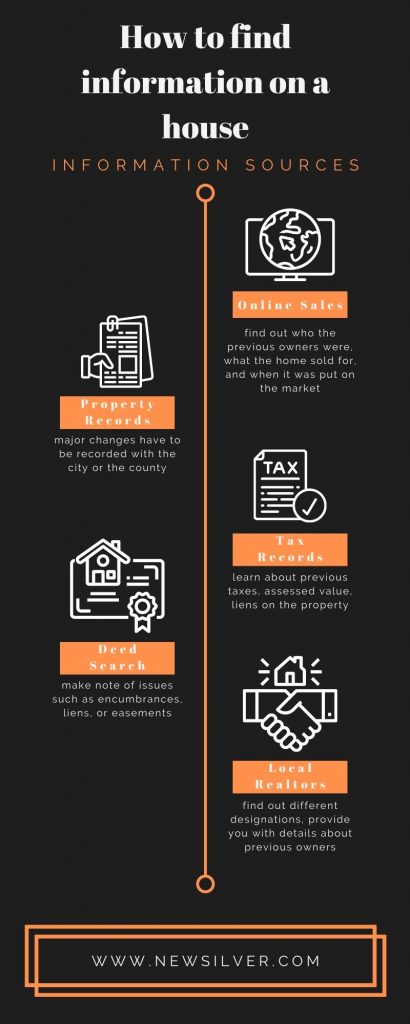There are many things an investor may wish to know about before buying: the history of the home, why the owners are planning to sell, and a million other reasons. With this much money involved, it’s no surprise that due diligence needs to be at the top of the priority list. The last thing you want to do is end up with a property that has hidden issues that will end up being more costly down the line.
The question is, how do you find information on a house beyond the easily-available facts online? If you’re looking for a more detailed record of previous owners, renovations, and more, you’ll need to know how to dig a little deeper. If you’re willing to go the extra mile there is a treasure trove of information you can learn to access.
If you’re looking to learn how to find information on a house, you’ve come to the right place. We’ve put together this full guide to teach you how to use property records and other sources to gain more information on a house:
Table of Contents
Before You Start

Prior to launching your search, you need to decide what kind of house you are planning to buy. The easiest way to do this is to sit down and closely evaluate your goals.
Are you hoping to buy the property to earn passive income with little active management? In this case, looking for a house suitable for rentals will be the best course of action. Investors that want to buy and hold are advised to target turnkey properties: homes that do not need major renovations in order to be ready for tenants to move in.
In your property search for a rental, you’ll also want to be careful not to purchase a home that will have no damages that turn up in six months’ time when you already have a tenant moved in.
If you want to sell the property after buying and flipping it, there are several things you will want to know about a home before buying it. Previous renovation records can be particularly helpful – many flips are older homes that will have seen multiple changes over the years. Getting an idea of what to expect before you buy the house can help you during the renovations you plan to undertake.
Once you have your goals clearly set up, you can move on to the next step, which is learning where to find the information you need. There are several sources you can make use of, starting with the one most accessible to you – an online sales history.
Using The Online Sales History
One of the easiest ways to learn more about a property is to go online. While it may not give you the full depth of what you need to know about a house, it will give you the basics that you need to go into further depth with your search.
With the internet, you can discover all kinds of information about a home with the added benefit of doing it all conveniently online. Many recorder’s offices today have introduced electronic files that are available for you to search through an online portal.
This history is another way to find out who the previous owners were, what the home sold for, and when it was put on the market. You may also be able to tell how much is left on the current owner’s remaining mortgage if applicable to the property you are reviewing.
With the basic facts in hand, you’re ready to go further.
Using Property Records
There are many things that you can learn from a property record search. Older homes in particular will come with a significant track record that you can track through to get the information you need.
What can these property records really tell you? Well, every time a major change is made to a house affecting the ownership, the changes have to be recorded with the city or the county. This is because major changes will have an impact on things like tax liens or transfers of ownership. Changes to the square footage of the home will be recorded, as will previous property sales.
Using property records you may be able to track down property deeds and even find the reason for previous sales. By digging a little deeper here, you’ll be able to learn key things like whether the land the house is built on has any specific restrictions when it was originally built and you may even find older property photos if you’re lucky!
Using The Tax Records
Tax records will contain pertinent information such as whether the taxes have previously been paid, what the property value was when it was previously assessed, whether any taxes are due and if there are liens on the property. A lien may be placed on the home if the owner owes money to their financier or the IRS.
If there are liens currently placed on the property, you might struggle to get a lender that will approve a loan for it. This type of transaction will take additional discussion and negotiation time with the seller since you don’t want to take on any of their property debt if you can avoid it.
With older homes, tax records can go back quite a bit, making it harder to find all the information online. The best option may be to contact your assessor’s office and try to visit them in person to see the physical records yourself.
A pro-tip for searching tax records is that some names are entered into the database with an alternative or incorrect spellings, and you may be able to pull up more information by trying a few variations of the name you are entering.
Using A Deed Search
Some investors decide to do a deed search when they are trying to find more information about a house. The offices of a county clerk, auditor, or recorder will be the best place to start with this approach. Some of these offices will have an online database that you can use to search deed records, but others will require you to visit in person
When looking at the deed history for a property, you’ll want to make note of issues such as encumbrances, liens, or easements. An easement, in this case, refers to someone else holding the right to use or access the land the home is built on. This usually happens when a lot has been subdivided and utility services are shared between the two properties.
Going through the deed history of the property, you’ll be able to gain more information about current and previous owners, the lot area, the council district, zoning information, and the assessed land value to name just a few. The deed history will also show the number of bedrooms and bathrooms the property has and its general square footage.
Using Divorce And Death Records
While somewhat morbid, there are many significant things that can be learned about a property from divorce and death records. This is because these are the situations in which people often let go of properties at a lower price.
These records will also indicate to you the reason the sellers have for putting their homes on the market. Copies of divorce and death records can be accessed at your local recorder or county clerk’s offices, or you can keep track of the newspapers for recent announcements.
Just remember when dealing with sellers in these situations, there can be a lot of emotion involved. You’ll want to be sensitive to their needs and approach the situation carefully.
Contact A Local Realtor
Another way to get the information you need is to work with a local realtor that has a lot of experience in the neighborhood the property is located in. Realtors will be able to tell you if a home has different designations, provide you with details about previous owners, and make you aware of any other pertinent information relating to the neighborhood.
The realtor should also be able to tell you if there is an active HOA where you are planning to buy and what the rules would be for a new owner. This is important because many HOA’s will have strict guidelines about the exterior of the property, the level of renovations that can be completed, and more. It’ll be key to connect with a realtor that has worked in the area you are interested in for a long time.
Putting Together The Details You Need
When you’re moving forward with these different investigative approaches, you’ll need a few details first.
There are a few obvious things you’ll need, such as the property address, and the name of the seller that has put it on the market. However, there are many other things you’ll need to try and determine before you go deeper into your search. You’ll want to find out, are you dealing with the owner directly or are there potentially multiple owners? What is the square footage and does it match what has been advertised?
The next thing you need to plan for is the fees associated with getting copies of records from the different offices you’ll need to work with. Gaining access to the records you want will see you pay a small processing fee, and if you want printed copies you may be asked to pay per page.
Lastly, remember that if you’re going to be visiting an assessor or recorders office, you’ll need to phone beforehand and ask how visits are working during the pandemic, what they will charge, and if you need to bring anything else with you.
Final Thoughts
Whichever way you decide to go about it, doing your due diligence and learning how to find information on a house will be key. Learning more about the home will help you discover potential pitfalls, find room for negotiation, gain more appreciation for the property and ultimately make a better investment decision.
There are many different ways to get more information about a house, and it will help to have your goals in mind when you go about your search. Think about how much renovation you are willing to do, and how you would go about it before you decide to make an offer.



